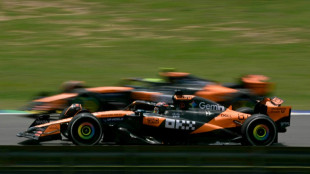
-
 England captain Stokes suffers facial injury after being hit by ball
England captain Stokes suffers facial injury after being hit by ball
-
Italy captain Lamaro amongst trio set for 50th caps against Scotland

-
 Piastri plays down McLaren rivalry with champion Norris
Piastri plays down McLaren rivalry with champion Norris
-
ECB holds interest rates as strong euro causes jitters

-
 Spain, Portugal face floods and chaos after deadly new storm
Spain, Portugal face floods and chaos after deadly new storm
-
EU close to sealing trade deal with Australia

-
 German Cup final to stay in Berlin until 2030
German Cup final to stay in Berlin until 2030
-
What does Iran want from talks with the US?

-
 Taming the lion: Olympians take on Bormio's terrifying Stelvio piste
Taming the lion: Olympians take on Bormio's terrifying Stelvio piste
-
Wind turbine maker Vestas sees record revenue in 2025

-
 Italy's Casse tops second Olympic downhill training
Italy's Casse tops second Olympic downhill training
-
Anti-doping boss 'uncomfortable' with Valieva's coach at Olympics

-
 Bitcoin under $70,000 for first time since Trump's election
Bitcoin under $70,000 for first time since Trump's election
-
'I am sorry,' embattled UK PM tells Epstein victims

-
 England's Brook predicts record 300-plus scores at T20 World Cup
England's Brook predicts record 300-plus scores at T20 World Cup
-
Ukraine, Russia swap prisoners, US says 'work remains' to end war

-
 Wales' Rees-Zammit at full-back for Six Nations return against England
Wales' Rees-Zammit at full-back for Six Nations return against England
-
Sad horses and Draco Malfoy: China's unexpected Lunar New Year trends

-
 Hong Kong students dissolve pro-democracy group under 'severe' pressure
Hong Kong students dissolve pro-democracy group under 'severe' pressure
-
Germany claws back 59 mn euros from Amazon over price controls

-
 Germany claws back 70 mn euros from Amazon over price controls
Germany claws back 70 mn euros from Amazon over price controls
-
VW and Stellantis urge help to keep carmaking in Europe

-
 Stock markets drop amid tech concerns before rate calls
Stock markets drop amid tech concerns before rate calls
-
BBVA posts record profit after failed Sabadell takeover

-
 UN human rights agency in 'survival mode': chief
UN human rights agency in 'survival mode': chief
-
Greenpeace slams fossil fuel sponsors for Winter Olympics

-
 Greenpeace slams fossel fuel sponsors for Winter Olympics
Greenpeace slams fossel fuel sponsors for Winter Olympics
-
Kinghorn, Van der Merwe dropped by Scotland for Six Nations opener

-
 Russia says thwarted smuggling of giant meteorite to UK
Russia says thwarted smuggling of giant meteorite to UK
-
Salt war heats up in ice-glazed Berlin

-
 Liverpool in 'good place' for years to come, says Slot
Liverpool in 'good place' for years to come, says Slot
-
Heathrow still Europe's busiest airport, but Istanbul gaining fast

-
 Highest storm alert lifted in Spain, one woman missing
Highest storm alert lifted in Spain, one woman missing
-
Shell profits climb despite falling oil prices

-
 Pakistan will seek govt nod in potential India T20 finals clash
Pakistan will seek govt nod in potential India T20 finals clash
-
China shuns calls to enter nuclear talks after US-Russia treaty lapses

-
 German factory orders rise at fastest rate in 2 years in December
German factory orders rise at fastest rate in 2 years in December
-
Nigeria president deploys army after new massacre

-
 Ukraine, Russia, US start second day of war talks
Ukraine, Russia, US start second day of war talks
-
Nepal's youth lead the charge in the upcoming election

-
 Sony hikes forecasts even as PlayStation falters
Sony hikes forecasts even as PlayStation falters
-
Rijksmuseum puts the spotlight on Roman poet's epic

-
 Trump fuels EU push to cut cord with US tech
Trump fuels EU push to cut cord with US tech
-
Fearless talent: Five young players to watch at the T20 World Cup

-
 India favourites as T20 World Cup to begin after chaotic build-up
India favourites as T20 World Cup to begin after chaotic build-up
-
Voter swings raise midterm alarm bells for Trump's Republicans

-
 Australia dodges call for arrest of visiting Israel president
Australia dodges call for arrest of visiting Israel president
-
Countries using internet blackouts to boost censorship: Proton

-
 Top US news anchor pleads with kidnappers for mom's life
Top US news anchor pleads with kidnappers for mom's life
-
Thailand's pilot PM on course to keep top job

| CMSC | -0.6% | 23.52 | $ | |
| GSK | 2.35% | 58.62 | $ | |
| RIO | -2.83% | 93.83 | $ | |
| BCC | -0.36% | 89.915 | $ | |
| BCE | -3.54% | 25.43 | $ | |
| NGG | -1.4% | 86.61 | $ | |
| JRI | 1.09% | 13.29 | $ | |
| RBGPF | 5.11% | 86.52 | $ | |
| AZN | 1.16% | 189.85 | $ | |
| BTI | 0.1% | 61.705 | $ | |
| RELX | 3.87% | 30.98 | $ | |
| VOD | -6.56% | 14.743 | $ | |
| BP | -2.34% | 38.3 | $ | |
| RYCEF | -1.87% | 16.62 | $ | |
| SCS | 0.12% | 16.14 | $ | |
| CMSD | -0.13% | 23.869 | $ |

'Love hormone'? Not so fast, new study suggests
The "love hormone" oxytocin has long been thought key to behaviours including pairing up with a partner and nurturing offspring, but a new study in prairie voles is raising doubts.
The research found that voles bred to lack functioning receptors for oxytocin were still able to form strong pairs, produce young and nurse -- all behaviours previously believed to depend on the hormone.
Prairie voles are one of the few mammals that mate for life, and are often used to study social behaviours like pair-forming in animals.
In past studies, voles given drugs that stopped oxytocin being processed no longer formed pairs, and mothers failed to produce milk for their young.
Psychiatrist Devanand Manoli and neurobiologist Nirao Shah produced genetically altered prairie voles without working oxytocin receptors, and then observed how the mutant male and female voles behaved.
To their shock, the mutant voles appeared to have no difficulty pairing up with non-genetically altered partners, and mutant females could still deliver and nurse young, unlike those in the drug-driven studies.
"We were certainly surprised," said Manoli, an assistant professor at the University of California, San Francisco.
The results suggest that oxytocin is not the main, or only, driver of activities like partnering or nursing, he said.
"What the genetics reveals is that there isn't a 'single point of failure' for behaviours that are so critical to the survival of the species," he told AFP.
- 'Very complex behaviours' -
That didn't mean there were no differences, however.
Some male mutant voles that paired with ordinary female partners didn't show the aggression towards interloping females that would normally be expected.
And while mutant females produced and nursed litters, some had fewer pups per litter than their counterparts, and fewer of their offspring survived to weaning, the paper published Friday in the journal Neuron explains.
Pups born to mutant mothers also tended to weigh less, suggesting that they were not able to nurse as effectively.
The study only involved pairing of mutant voles with "wild-type" partners, and the researchers said pairings with two mutant partners could produce different results.
Still, as a whole, the findings suggest a different picture of oxytocin's role in several important behaviours.
That could be because animals bred without the receptors developed "other compensatory pathways" that helped them pair up and nurse, said Shah, a professor at Stanford University.
But the researchers suggest it likely means oxytocin is only part of a set of genetic factors that control social behaviour.
"What I think our studies reveal is that there are multiple pathways that regulate these very complex behaviours," said Manoli.
Oxytocin has sometimes been suggested as a way to treat attachment disorders and other neuropsychiatric issues, but there is little settled science on how effective it is.
Now the researchers hope to investigate what other hormones and receptors may be involved in behaviours like pairing and nursing.
"These other pathways might serve as new therapeutic targets," Manoli said.
Z.AbuSaud--SF-PST




